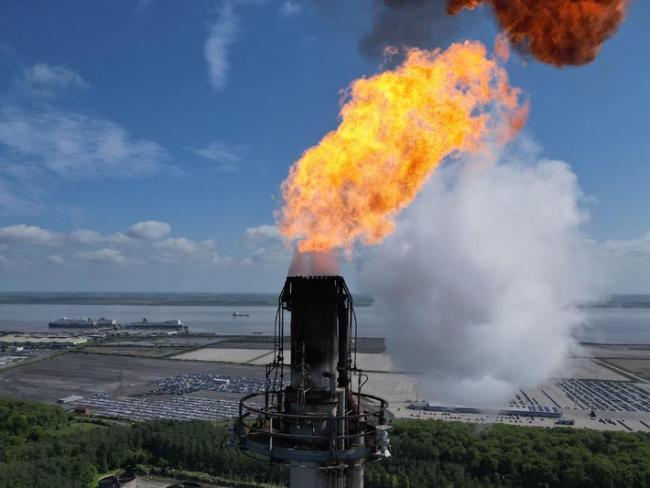
The oil refinery overlooks the River Humber. Photo Lindsey Oil Refinery via Alamy (public domain).
Liquidators have taken over Lindsey oil refinery in Lincolnshire, which is set to close. In June the owner Prax Group went into administration, putting 420 jobs directly at risk. It is one of only six refineries in Britain – and one of those, Petroineos Grangemouth, is about to shut.
Energy minister Michael Shanks said in July there were “no credible offers” to buy the whole refinery. Production ended at the beginning of August. But pleas from local politicians for the government to continue the search for a buyer of the whole operation have not met with success. There are some reports of interest in the site or parts of the business.
The plant has provided 10 per cent of Britain’s fuel supply. It is significant to the fuel supply and industry of Lincolnshire and the Midlands. The highly skilled workers who work at the plant are facing redundancy.
Unite the Union said that the government should “…reverse the premature decision to stop buying crude oil and to extend the time to find a viable long-term solution for the site.” The union pointed out that the jobs of other workers beyond those at the site rely on the refinery. The union is also asking questions about the huge amounts that owners Sanjeev Kumar and Arani Soosaipilla were paying themselves while their business was failing – at least £11.5 million in pay and dividends between when they bought the refinery in 2021 and June of this year.
Unite general secretary Sharon Graham said that the Prax owners “…must be held to account for endangering a critical piece of national energy infrastructure and leaving hundreds of workers in uncertainty about their livelihoods.” Government officials managing the liquidation have been unable to track down the owners.
• In 2009, workers at Lindsey refinery, then owned by Total Energy, went on strike after foreign contractors were brought in rather than offering jobs to British workers. Total sacked hundreds of workers for taking unofficial action, which promoted a further strike and support from construction workers elsewhere. Almost all were reinstated.
